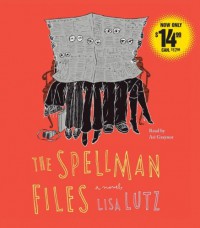

When I started "The Spellman Files", I expected it to be a light-hearted, anarchic, PI story, with attitude. What I got was different and probably better.
"The Spellman Files" is full of witty lines and comic situations that spin out of control but at heart, it's really quite serious and more than a little sad. The laughter it produces is a defence mechanism for dealing with watching a family,that has no concept of normal, inflict damage on each other without any malice being involved.
The story is told from the point of Elisabeth Spellman, twenty-eight years old, still living at home, still single (possibly because she sees all of her lovers as future ex-boyfriends and refers to them by number for example ex-boyfriend #3 ) and still working for her parents in the family Private Investigation agency that she's been active in since her childhood.
She is the middle of three children. Her older brother is perfect and has escaped the family business and become a lawyer. Her (fourteen years) younger sister dreams of inheriting the business, does surveillance as a hobby, wants everyone to be happy and believes everything can be negotiated.
Much of the humour and all of the sadness in this book comes from the fact that the Spellmans' version of normal life is one in which family members spy on each other, engage in high-speed car chases and routinely interrogate, threaten and punish one another. There are no boundaries between work and family life. Privacy is something that you get only by taking active counter-surveillance measures. Trust is non-existant, yet love, quite deeply felt love, is all pervasive. Iz reminded me of the opening to a Philip Larkin poem: "They fuck you up, your mum and dad"
The story is told in an elaborately non-linear way that means that you discover the Spellman family an anecdote at a time, as you might be visiting them. The anecdotes have the grandiloquent titles that we give to stories that are part of family lore: "The War Of The Shirt" or "Fake Dental Appointment #2" or the one that opens the novel, "Car Chase #3". It takes skill to pull this off and Lisa Lutz does it flawlessly.
Ari Graynor does a wonderful job in narrating all this structured chaos and bringing the characters to life with distinct and easily recognisable voices. I suspect this is a book that is better in the audio version than as text because Ari makes sure no nuances are missed.
Even though I found the book more funny than sad, I couldn't put it down. It was weirdly compelling, perhaps because, beneath all the chaos and the mutual abuse, the Spellmans love each other as much as they are able, so their paranoia is always leavened with affection.
In the interview below, Lisa Lutz talks about "The Spellman Files" and shares some of here own experiences from working for a family PI business.
[youtube https://www.youtube.com/watch?v=p9R9X8e9gPs&w=560&h=315]
Click on the SoundCloud link below for a sample of Ari Graynor reading "The Spellman Files".
[soundcloud url="https://api.soundcloud.com/tracks/98433737" params="auto_play=false&hide_related=false&show_comments=true&show_user=true&show_reposts=false&visual=true" width="100%" height="450" iframe="true" /]

 1
1









